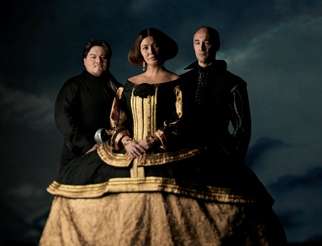|
Back
Epic Grandeur Melbourne
State Theatre
05/20/2015 - & May, 23, 25*, 27, 29, 26, 30, 2015
Giuseppe Verdi: Don Carlo
David Parkin (Monk/Carlos V), Victoria Yastrebova (Elisabeth de Valois), Milijana Nikolic (Princess Eboli), Diego Torre (Don Carlos), José Carbó (Rodrigo, Count of Posa), Giacomo Prestia (Philip II), Jonathan Abernethy (Count Lerma), Daniel Sumegi (Grand Inquisitor), Anna Dowsley (Tebaldo), Julie Lea Goodwin (Voice from Heaven), Simon Kim (Herald), Pelham Andrews (Deputy 1), Luke Gabbedy (Deputy 2), Richard Anderson (Deputy 3), Adrian Tamburini (Deputy 4), Andrew Moran (Deputy 5), Graeme Macfarlane (Deputy 6).
Opera Australia Chorus, Anthony Hunt (Chorus Master), Orchestra Victoria, Andrea Licata (Conductor)
Elijah Moshinsky (Director), Paul Brown (Set & Costume Designer), Nigel Levings (Lighting Designer)

D. Torre, M. Nikolic, J. Carbó (© Courtesy Opera Australia)
An intricate plot of palace intrigues, foreign politics, impossible love; majestic authoritarian power, church v state, and the Spanish Inquisition; and, a libretto which leaps from theme to theme assuming that the audience can keep track of the narrative, all mean that Don Carlos becomes a massively challenging work to stage and to make sense of. For their final offering in this Melbourne Autumn season, Opera Australia reprise Elijah Moshinsky’s much admired setting after some careful re-imaginings and judicious re-design. This production is the four act Milano version from 1884. It premiered in 1999 but seems fresh today as if newly devised. It is not an easy work for audience or performers but the splendour and magnificence of the production bring great credit to the company.
The set recalls interiors of the Escorial Palace: towering green marble walls, polished monuments and murky lighting casting looming shadows, suggesting sinister motives. There are many opportunities here to shroud meaning in mystery and to conceal ominous threats. The costumes evoke a Velasquez painting; dark, textured, exuding immense wealth and power and dazzling against dark interiors. Spanish ladies vie for attention among the fashions of the French court, rivalries are played out in immense hooped skirts and intrigues are plotted behind gently fluttering fans. This is a world of posture and poses and against this veneer of superficiality, politics and love are subdued while duty and power are played as trump cards.
Mr. Moshinsky’s direction allows intense characterisation through subtle gestures. A hint or a glance condemns; being in the wrong place leads to banishment and hiding a forbidden love among the whisperers is impossible.
As Elisabeth, Russian soprano Victoria Yastrebova brought innocence and youth to the stultifying rigidity of the Spanish court. Somewhat overpowered by both orchestra and the tenor in her early scenes, she achieved great intensity and presence in the latter parts of the opera. Her rendition of “Tu che le vanità conosce” in the fourth act was galvanising. Surety of tone, absolute control of modulation and entirely plausible acting made this a pivotal point in the opera. Ms. Yastrebova earned well-deserved audience admiration for her singing.
Returning to Opera Australia, Mexican tenor Diego Torre brought formidable power and tone to the role of Carlos. He was determined and forthright, unafraid to lay claim to his status and his singing reflected his strength. His voice in this, as in previous productions had a brilliant sheen in the upper register, contrasted by a richly masculine depth. In the ensembles, Mr Torre dominated all other voices with the exception of Mr. Carbó whose portrayal of Rodrigo was complex and compelling. Together, their duets were stellar, each powering off the other’s notes, forming a wholly magnificent unison.
As Princess Eboli, Milijana Nikolic brought control and pathos. Her “veil song” offered hints of seduction and allure but lacked surety in the upper register. By the conclusion of the performance, Ms Nikolic had stamped the role with her mark of authority and confidence. She was roundly cheered for her performance as was Italian bass Giacomo Prestia as King Philip. His presence was consistently majestic. Severe, potent and vigorous, he drove much of the action with intense acting as much as dominant vocal ability. In contrast, his lament at the start of Act Three breathed an entirely new dimension into the character. His rendition was touching and heartsore and drew a most enthusiastic response from the audience.
In its multiple guises, the Opera Australia Chorus did credit to their many roles. Disciplined, meticulous and expertly prepared, they drove the great auto-da-fe scene, riveting attention with pageantry and expert control. Theirs was a masterful contribution to the overall impact of the opera.
Under Andrea Licata, Orchestra Victoria rode a tidal wave of emotions and passion. At times, a little too brassy in the first and second acts, they produced lustrous sounds in the latter scenes.
As Elijah Moshinsky observes in his program notes, this opera has “a difficult shape”. He has created however, a sumptuous visual feast; a moving Vélasquez painting which captures the light and shade, the duty and dishonesty and the public and private worlds of the characters. The capacity audience thrilled to some excellent music making amid dazzling spectacle.
Gregory Pritchard
|